Hepatitis - Everything you need to know
- Written by Tommy Gonzales on January 9, 2021. Updated and republished in June 2021.
- Medically reviewed by Dr Andrea Pinto Lopez, M.D.
Hepatitis is a condition caused by an inflammation of the liver, which is typically caused by viruses. However, there are other things that can cause hepatitis, such as autoimmune disorders, excessive alcohol intake, and certain medications and drugs.
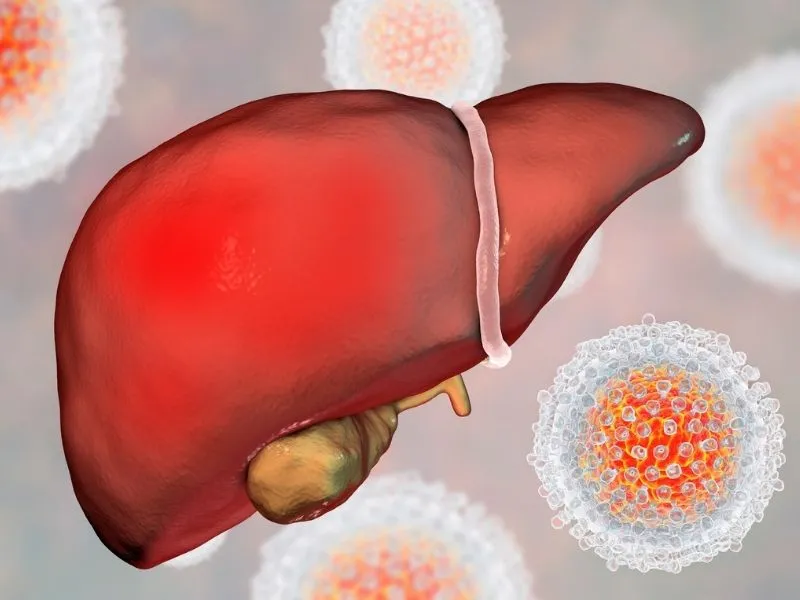
What are the most common types of viral hepatitis?
The most common types of Hepatitis are A, B and C, which are each one caused by a different type of virus.
Read on to learn everything you need to know about hepatitis A, hepatitis B and hepatitis C, as well as the causes, symptoms and treatment of each condition.
Hepatitis A
Hepatitis A is a liver infection caused by the hepatitis A virus (HAV), which is found in the stool and blood of infected people.
How is hepatitis A transmitted?
Hepatitis, A can be transmitted when someone is unknowingly ingesting the virus trough personal contact with an infected person or through eating a contaminated food or drink, [1] as well as via sexual activities with an infected person.[2]
Hepatitis B
Hepatitis B is an infection caused by the hepatitis B virus (HBV) which commonly causes inflammation of the liver.
How is hepatitis B transmitted?
It is spread when blood, semen, or other body fluids from a person infected with the virus enters to the body of another non-infected person.
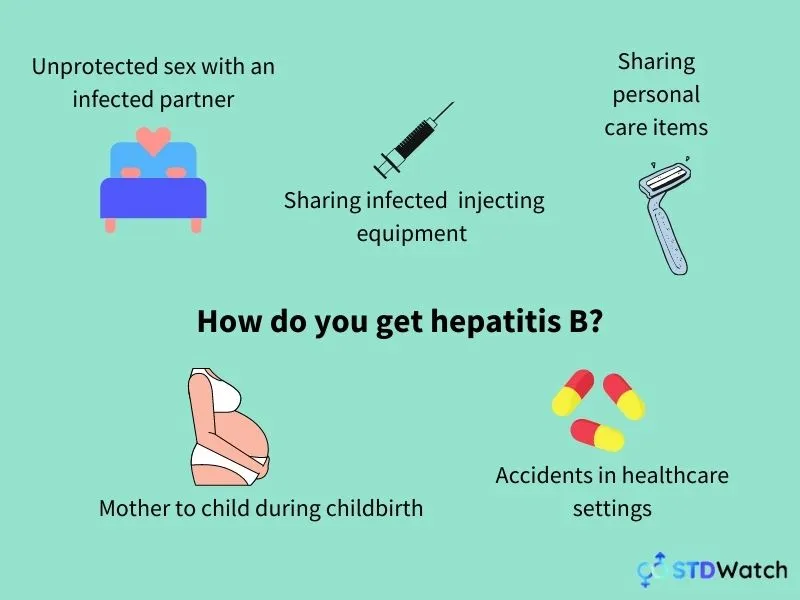
Read: What is hepatitis B?
Hepatitis B can be spread both sexually and non-sexually taking place through sexual contact, infected syringes, or mother to baby at birth.
In the case of sexual transmission, Hepatitis B is 50 to 100 times easier to transmit sexually than HIV and has been found to be present in different bodily fluids as vaginal secretions, saliva, and semen.
Within the forms of sexual transmission are vaginal sex, anal sex, and oral sex. The transmission via kissing is unknown, yet, as the virus has been found in saliva there is a possible physiological route of transmission if sores, open cuts or even braces are present in the mouth. [3] But although getting hepatitis B from kissing is theoretically possible, the chances of this actually happening are very low in real life.
Hepatitis has been detected with a higher presence in people of sexual promiscuity. In the case of men having sex with men, these have 10 to 15 times higher risk of HVB. People being in a long term monogamous and faithful relationships rarely contracting the virus.
For non-sexual routes of transmission and in the absence of interventions, the risk of transmission from mother to child goes around 70% to 90% from those mothers with a high HVB viral load. [4] Fortunately, there are treatments available that can be given to the newborn within the first few hours of their life to prevent this.
Additionally, transmission of HBV to children involving contaminated environmental objects have been documented to play an important role in transmission of the disease.
As the virus can survive for up to 7 days outside of the body, including in dried blood, it can be passed through items such as razors or toothbrushes from an infected person.[5]
In the case of other routes of transmission as transfusion of blood and plasma, this has been practically eliminatedthanks to the implementation of thorough lab testing whenever someone donates blood.
Besides, transmission in the healthcare setting is still existent. This is especially true for health workers due to non-adherence to guidelines and preventive measures on the surgery room, hemodialysis unit, etc. which may cause HBV transmission. [6]
Hepatitis B symptoms in men and women
Acute or short-term symptoms of hepatitis include:
- Jaundice (yellow skin and sclera, which makes the eye yellow).
- Dark urine (pee).
- pale or clay-coloured stools.
- Abdominal pain.
- Diarrhoea.
- Loss of appetite or/and weight.
- Flu-like symptoms (tiredness, fever, aches).[7]
Read: Hepatitis B symptoms: What are the symptoms of hepatitis B?
Hepatitis B will not produce symptoms in all cases, if fact, many cases of HBV will be asymptomatic.
In the case symptoms arise, they normally will be noticed 2-3 months after infection occurs, lasting 3 months in the case of acute or short-term hepatitis.
Some people with Hepatitis B are sick for some weeks, which is referred as an “acute” infection, besides for others, it progresses to serious lifelong illness known as chronic hepatitis B.
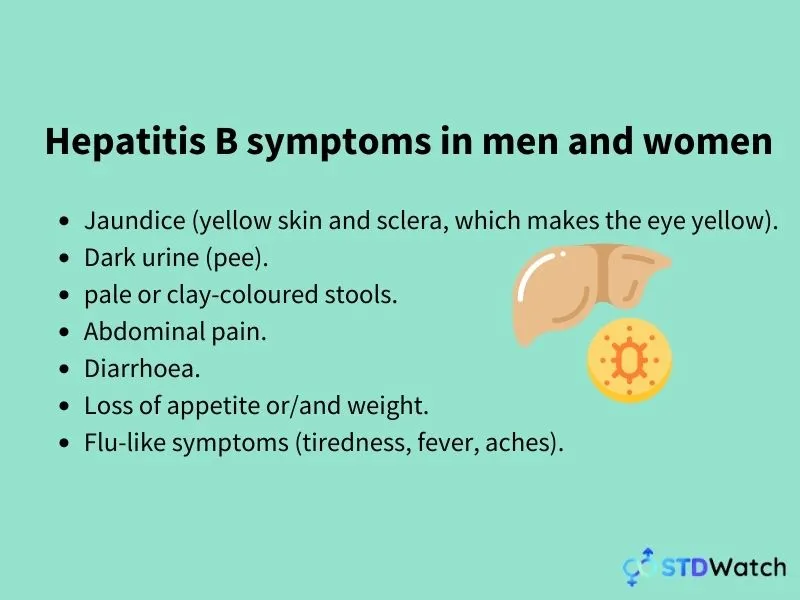
Hepatitis B test
Hepatitis B test detects the viral proteins (antigens) that your body produces in response to the infection or detect the DNA of the virus present in the blood.
If the test is performed in the laboratory, a blood sample may be drawn from a vein in your arm to collect the sample.
Home tests are also available for detecting both hepatitis B and C, these tests will require to extract a small drop of blood with a lancet and to collect into a small tube or collection card.[8]
What are the complications of hepatitis B?
Chronic HBV infection can cause serious complications for people in the liver, which is the principally affected organ by this disease.
In this case, the liver can get compromised by scarring tissue (cirrhosis) weakening the liver’s capabilities to function.
Hepatitis B also may lead to liver cancer, with individuals infected with chronic hepatitis B having a 25-40% lifetime risk of developing it. [9] In fact, 54% of cases of liver cancer worldwide are caused by hepatitis B. [10]
How does hepatitis B affect a pregnant woman and her baby?
If you are pregnant, please take note the infection can be passed to the baby through delivery.
If this is the case, the first shot of HVB vaccine should be given to the baby within 12 hours of being born to give your baby an extra boost to fight the disease, for this reason early detection of HBV before or during pregnancy is highly important.
According to the CDC, all pregnant women should get a blood test for hepatitis B as part of their prenatal care.[11]
Can hepatitis B be prevented?
To prevent Hepatitis B from spreading, the CDC recommends vaccination against the disease.
Other forms of protection also include wearing gloves when leaning others, covering all open cuts or wounds, not sharing razors, toothbrushes, nail care tools, or pierced earrings. [12]
Read: Everything you need to know about the hepatitis B vaccine
Hepatitis B can be shared easily through sexual contact with an infected person.
If sexual activities are performed, practicing it only inside a faithful, long-term, and mutually monogamous relationship such as marriage with a person who has not had any previous sexual contact during lifetime or tested negative for STDs, including HBV, is the closest method to 100% to prevent yourself from any STD including HBV.
Can hepatitis B be cured?
Currently there is no existent cure for Hepatitis B. Besides, the disease can go away by its own within a few months or disappears in people with a chronic case of hepatitis.
Hepatitis C
Hepatitis C is a viral infection which causes inflammation of the liver and in some instances can lead to damage of the liver. [13]
How is hepatitis C Transmitted?
Hepatitis C is passed via blood contaminated with the virus which enters the bloodstream of a non-infected person.
Because is transmitted via blood-to-blood contact, the risk if transmission is considered extremely low in heterosexual relationships.
In a study of 895 monogamous heterosexual couples whose partner was infected with HCV, over a 10-year period one of them got infected by their partner. [14]
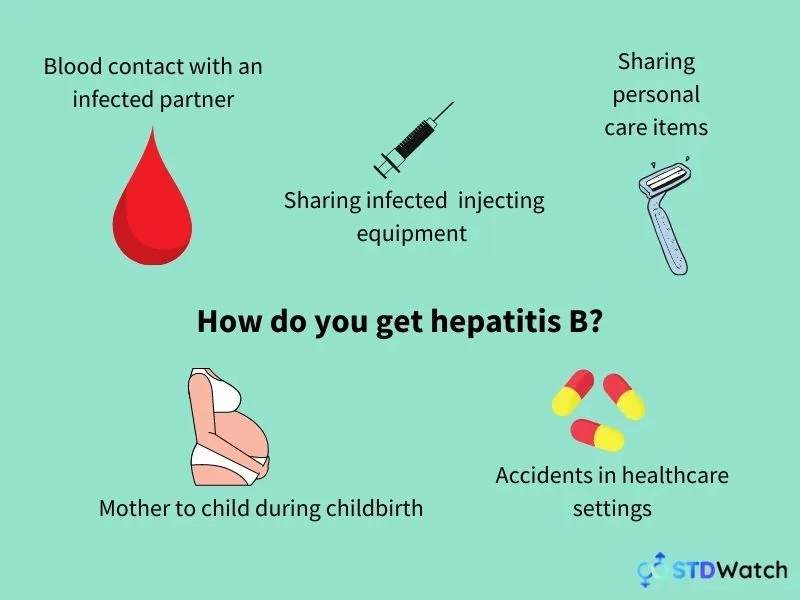
What are the signs and symptoms of hepatitis C?
Symptoms and complications associated to hepatitis C are very similar for men and women [15], being among the following:
- Bleeding.
- Bruising.
- Fatigue.
- Poor appetite.
- Jaundice, meaning a yellow discoloration of skin and eyes.
- Dark-colored urine.
- Itchy skin.
- Fluid buildup in the abdomen.(ascites).
- Swelling of the legs.
- Weight loss.
- Confusion.
- Spiderlike blood vessels (spider angiomas). [16]
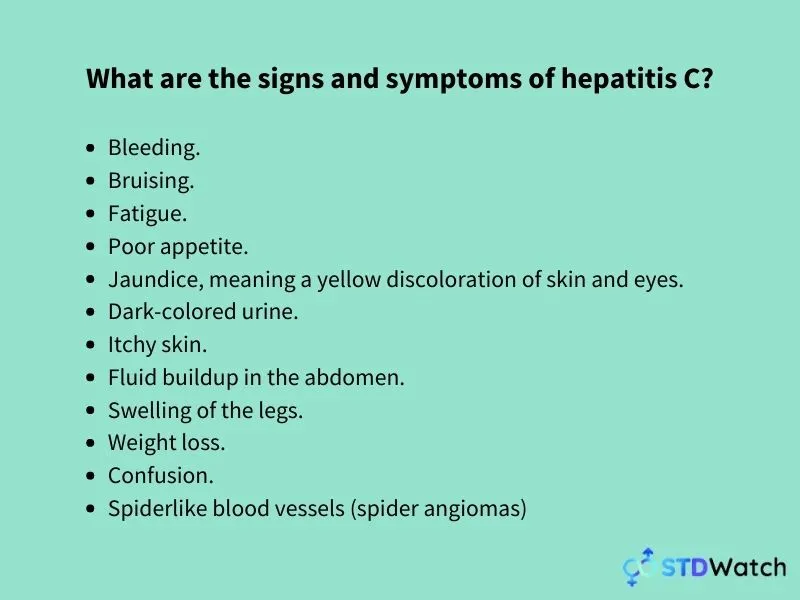
The signs and symptoms in hepatitis C are similar for men and women, besides, it is important to emphasize that hepatitis C is a silent disease and it rarely causes symptoms, which usually develop within the acute phase when cirrhosis has developed in the liver.
Please take note besides symptoms are similar, the disease can progress slower in women. Just in specific cases, women may experience a rapid progression of the disease, this is the case especially after menopause.
Hepatitis C test
Hepatitis C test detects the viral proteins (antigens) that your body produces in response to the infection or detect the RNA/DNA of the virus present in the blood. If the test is performed in the laboratory, a blood sample may be drawn from a vein in your arm to collect the sample.[17]
Home tests are also available for detecting both hepatitis B and C, these tests will require to extract a small drop of blood with a lancet and to collect into a small tube or collection card.[18]
What are the complications of hepatitis C?
About 30 of 100 people infected with hepatitis C will clear on their own. The other remaining 70% will develop chronic hepatitis.[19] When turned into this phase, Hepatitis C can lead to other complications as cirrhosis or scarring of the liver, affecting its functions.
Additionally, hepatitis C can cause liver cancer, which statistically takes place among 4 in each 100 people suffering from the disease.
Because hepatitis C can show few or no symptoms, it is very important to recognize the risk factors and get screened in case of frequent exposition.
How does hepatitis C can affect woman during pregnancy or her baby?
If a mother is infected with HCV, there is a risk of 4-7% of transmission to the baby at the time of delivery. [21]
During the pregnancy, hepatitis C has not shown to cause any problems. After delivery, 18 months are necessary for the baby before testing, as this is the amount of time necessary for the baby to clear out the mother antibodies.[22]
Can hepatitis C be prevented?
At this moment, there is no effective vaccine for hepatitis C, for this reason, it is crucial for people to minimize exposition to risk factors to prevent transmission to them or others. Among the actions to prevent hepatitis C are:
- Safe and appropriate use of health care injections.
- Safe handling and disposal of waste or sharps.
- Preventing exposure to blood during sex, this can take place specially by preventing sex activities during menstruation or in the case of Men Sex with Men (MSM) activities.
Can hepatitis C be cured?
Fortunately, from the 7 viruses that can cause cancer, Hepatitis C is the only one that is curable. If found and treated early, hepatitis c infection can be cured in 90%-95% of the cases. [22]
References
- [1] Hepatitis A Information - FAQs, Statistics, Data, and Guidelines. (2020, June 22). Retrieved December 18, 2020, from https://www.cdc.gov/hepatitis/hav/index.htm
- [2] Sexual Transmission and Viral Hepatitis. (2020, September 21). Retrieved December 21, 2020, from https://www.cdc.gov/hepatitis/populations/stds.htm
- [3] Hepatitis and Sex Questions: Transmission, Kissing, Condoms, and More. (2020, June 19). Retrieved December 18, 2020, from https://www.webmd.com/hepatitis/hepatitis-and-sex-frequently-asked-questions
- [4] Hepatitis: Preventing mother-to-child transmission of the hepatitis B virus. (n.d.). Retrieved December 18, 2020, from https://www.who.int/news-room/q-a-detail/hepatitis-preventing-mother-to-child-transmission-of-the-hepatitis-b-virus
- [5] Hepatitis B Testing. (n.d.). Retrieved December 18, 2020, from https://labtestsonline.org/tests/hepatitis-b-testing
- [6]Kim, W. (2009, May). Epidemiology of hepatitis B in the United States. Retrieved December 18, 2020, from https://www.ncbi.nlm.nih.gov/pmc/articles/PMC3290915/
- [7] Hepatitis B symptoms & treatment. (2020, August 28). Retrieved December 18, 2020, from https://www.avert.org/sex-stis/sexually-transmitted-infections/hepatitis-b
- [8] Home Hepatitis B & C Test, Confidential At Home Testing Kit, Results Online. (n.d.). Retrieved December 18, 2020, from https://www.letsgetchecked.com/us/en/home-hepatitis-b-c-test/
- [9] Risk Factors. (n.d.). Retrieved December 18, 2020, from https://www.hepb.org/research-and-programs/liver/risk-factors-for-liver-cancer/
- [10] Risk Factors. (n.d.). Retrieved December 18, 2020, from https://www.hepb.org/research-and-programs/liver/risk-factors-for-liver-cancer/
- [11] Protect Your Baby for Life. (2020, January). Retrieved December 21, 2020, from https://www.cdc.gov/hepatitis/hbv/pdfs/hepbperinatal-protectwhenpregnant.pdf
- [12] Nazario, B. (2020, September 08). Hepatitis B: Symptoms, Causes, Transmission, Treatments, Medications & Prevention. Retrieved December 18, 2020, from https://www.webmd.com/hepatitis/digestive-diseases-hepatitis-b
- [13] Hepatitis C. (2020, March 20). Retrieved December 18, 2020, from https://www.mayoclinic.org/diseases-conditions/hepatitis-c/symptoms-causes/syc-20354278
- [14] Sexual contact. (n.d.). Retrieved December 21, 2020, from http://www.hepctrust.org.uk/information/risk-factors/sexual-contact
- [15] Higuera, V. (2019, February 01). What Are the Symptoms of Hepatitis C in Women? Retrieved December 18, 2020, from https://www.healthline.com/health/hepatitis-c/symptoms-in-women
- [16] Hepatitis C. (2020, March 20). Retrieved December 18, 2020, from https://www.mayoclinic.org/diseases-conditions/hepatitis-c/symptoms-causes/syc-20354278
- [17] Hepatitis C Testing. (n.d.). Retrieved December 18, 2020, from https://labtestsonline.org/tests/hepatitis-c-testing
- [18] Home Hepatitis B & C Test, Confidential At Home Testing Kit, Results Online. (n.d.). Retrieved December 18, 2020, from https://www.letsgetchecked.com/us/en/home-hepatitis-b-c-test/
- [19] MD Anderson Cancer Center, & Underferth, D. (2019, May 08). Hepatitis C and liver cancer: What to know. Retrieved December 18, 2020, from https://www.mdanderson.org/publications/focused-on-health/HepatitisC-liver-cancer-What-you-need-to-know.h16Z1591413.html
- [20] HCV. (2019, May 22). Retrieved December 21, 2020, from https://www.cdc.gov/nchhstp/pregnancy/challenges/hcv.html
- [21] Mother to baby. (n.d.). Retrieved December 21, 2020, from http://www.hepctrust.org.uk/information/risk-factors/mother-baby
- [22] MD Anderson Cancer Center, & Underferth, D. (2019, May 08). Hepatitis C and liver cancer: What to know. Retrieved December 18, 2020, from https://www.mdanderson.org/publications/focused-on-health/HepatitisC-liver-cancer-What-you-need-to-know.h16Z1591413.html
